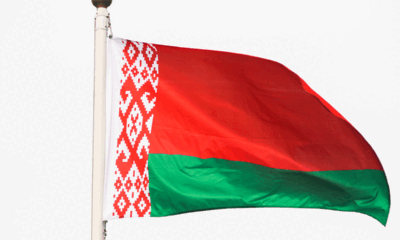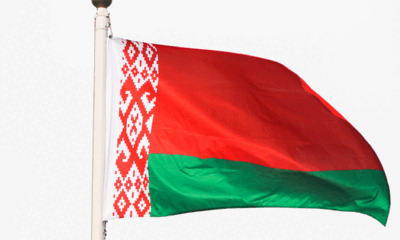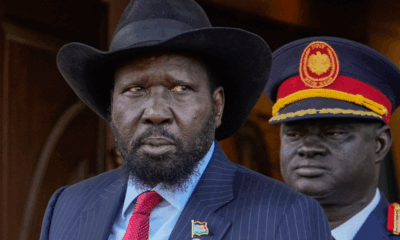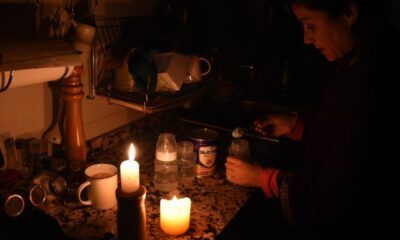INTERNACIONAL
Belarus declines observation invite for parliamentary elections

- Belarusian authorities said Monday that they will not invite the Organization for Security and Cooperation in Europe to monitor the nation’s Feb. 25 elections.
- Minsk «has informed the OSCE about its intention not to invite observers and offered its arguments and motivation,» according to international delegate Andrei Dapkiunas.
- The move is considered yet another power grab by the authoritarian regime of President Alexander Lukashenko, a close ally of Russian President Vladimir Putin.
Belarusian authorities on Monday said they will not invite observers from the Organization for Security and Cooperation in Europe to monitor the country’s parliamentary and local elections, scheduled for Feb. 25.
The move is the latest authoritarian President Alexander Lukashenko has undertaken in recent years to further cement his control over the country’s political institutions.
Belarus «has informed the OSCE about its intention not to invite observers and offered its arguments and motivation,» said Andrei Dapkiunas, Belarus’ permanent representative to international organizations in Vienna.
BELARUS’ AUTHORITARIAN LEADER TIGHTENS CONTROL OVER THE COUNTRY’S RELIGIOUS GROUPS
Belarus is a member of the OSCE, and members of its Office for Democratic Institutions and Human Rights have been the only international observers at Belarusian elections for decades.
The parliamentary vote on Feb. 25 will be the first election since the contentious 2020 presidential balloting that gave Lukashenko his sixth term in office and triggered an unprecedented wave of mass protests around the country.
Lukashenko’s government responded to the demonstrations with a harsh crackdown, arresting more than 35,000 people. Many of those have been brutally beaten by police and were forced to leave the country.
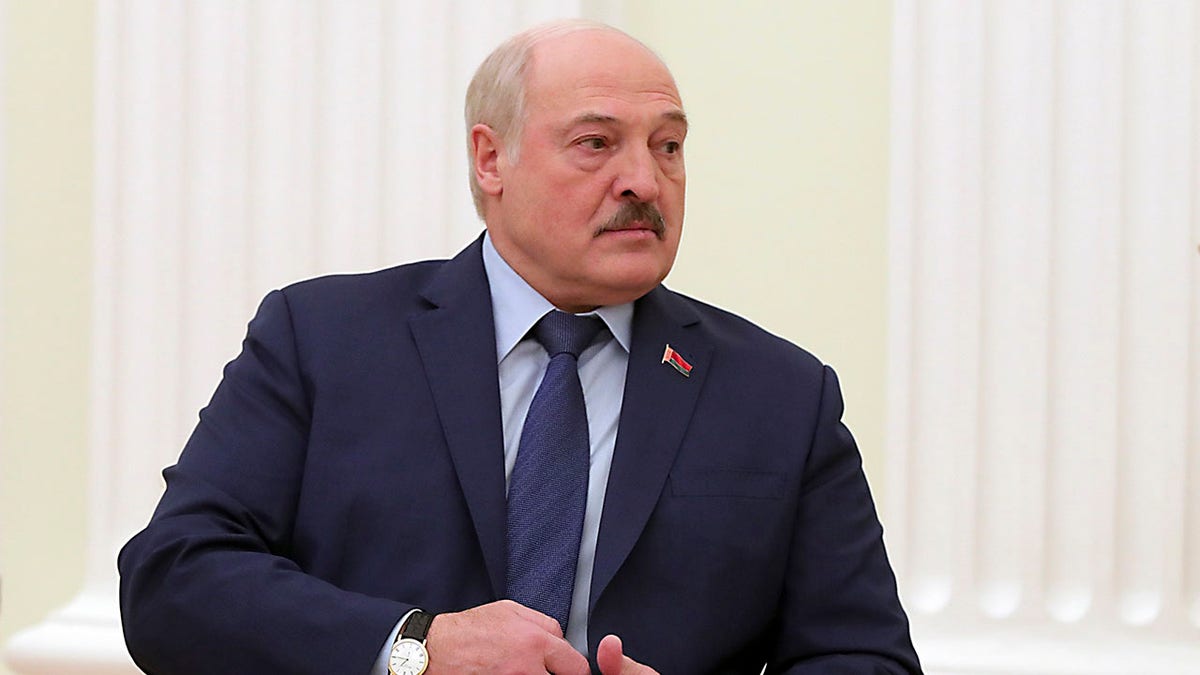
Belarusian President Alexander Lukashenko listens to Russian President Vladimir Putin during their meeting in Moscow, Russia, Friday, March 11, 2022. (Mikhail Klimentyev, Sputnik, Kremlin Pool Photo via AP)
This year’s election will take place amid continued repressions and as some 1,500 political prisoners remain behind bars, including leaders of opposition parties and renowned human rights advocate and 2022 Nobel Peace Prize winner Ales Bialiatski.
Belarusian authorities have also carried out «re-registration» of political parties operating in the country of 9.5 million, granting credentials to only four pro-government parties out of 15 that had operated in the country at the beginning of last year. Opposition politicians are not expected to get on the ballot.
Ihar Karpenka, the head of Belarus’ Central Election Commission, said that the election will take place «under full control of the authorities and without destructive influences.»
«Belarus holds the election for itself first and foremost,» Karpenka said, adding that Belarusian authorities will invite observers from Russia and Central Asian nations.
Since 1995, all elections and referendums in Belarus have been deemed by the Office for Democratic Institutions and Human Rights of the OSCE as not conforming to the organization’s standards and being neither transparent nor fair. Meanwhile, observers from Russia and countries allied with Belarus view all the votes within the country as democratic.
LUKASHENKO SIGNS LAW GRANTING SELF CRIMINAL IMMUNITY FOR LIFE
Belarusian opposition leader Sviatlana Tsikhanouskaya, in exile in neighboring Lithuania, urged Belarusians to boycott the February vote, calling it «a farce without international monitoring.»
«Lukashenko’s regime did everything to make the change of power through elections impossible in the country,» Tsikhanouskaya said.
Once both the parliamentary vote and local elections are concluded, a new state body will be formed — the All-Belarusian People’s Assembly. It will feature 1,200 delegates that will include officials, members of local councils, unions, pro-government activists and others, and will operate in parallel with the parliament, which consists of two chambers: the lower house of 110 lawmakers and the upper house of 64 senators.
CLICK HERE TO GET THE FOX NEWS APP
The Assembly, created by Lukashenko, has broad powers and can decide on policies, draft legislation, propose constitutional amendments, appoint members of the election commission and judges. According to the law, the president of Belarus automatically becomes a member of the Assembly after stepping down.
INTERNACIONAL
Denmark PM repeats Greenland ‘not for sale,’ but would welcome more American troops on Arctic island

Danish Prime Minister Mette Frederiksen repeated on Monday that Greenland is «not for sale,» but she remained open to bolstering the American «footprint» on the Arctic island.
As European Union leaders convened for a meeting in Brussels, Frederiksen addressed President Donald Trump’s prospect of acquiring control of Greenland, a self-governing territory of Denmark, a U.S. ally, through military or economic force.
«I think we have been very clear from the Kingdom of Denmark, with great support from the European partners and the European Union, that everybody has to respect the sovereignty of all national states in the world, and that Greenland is today a part of the Kingdom of Denmark, it is a part of our territory, and it’s not for sale,» Frederiksen told reporters, speaking in English. «The chairman, the leader of Greenland, has been very clear that they are not for sale.»
Frederiksen signaled that Denmark would welcome Trump sending more troops to Greenland, where the U.S. Space Force already has a base to monitor missile threats.
US FLIES JOINT PATROL WITH THE PHILIPPINES NEAR SHOAL REGION GUARDED BY CHINA
Danish Prime Minister Mette Frederiksen talks to media before an informal EU leaders’ retreat on Feb. 3, 2025, in Brussels, Belgium. (Thierry Monasse/Getty Images)
«I totally agree with the Americans that the High North, that the Arctic region is becoming more and more important when we are talking about defense and security and deterrence,» Frederiksen said, as China and Russia have both been increasingly active in the region. «And it is possible to find a way to ensure stronger footprints in Greenland. They [the U.S.] are already there, and they can have more possibilities. And at the same time, we are willing to scale up from the Kingdom of Denmark. And I think NATO is the same. So if this is about securing our part of the world, we can find a way forward.»
Frederiksen also responded to Trump’s threat of implementing tariffs on imports from the European Union. The Danish leader said EU members «are willing to help each other and to stick together, and I will never support the idea of fighting allies, but of course, if the U.S. puts tough tariffs on Europe, we need a collective and robust response.»
Last week, her government announced a nearly $2 billion agreement with parties, including the governments of Greenland and the Faeroe Islands, to «improve capabilities for surveillance and maintaining sovereignty in the region.» It would include three new Arctic naval vessels, two additional long-range surveillance drones and satellite capacity, the Danish Defense Ministry said.
Meanwhile, European Council President Antonio Costa, noting that the EU has stood beside Ukraine in defense of its borders, said of Greenland on Monday: «Of course, we will stand also for these principles, all the more so if the territorial integrity of a member state of the European Union is questioned.»
Trump has said the United States needs control of Greenland, as well as the Panama Canal, for «national security purposes.» While Secretary of State Marco Rubio visited Panama this week, Panamanian President José Raúl Mulino pledged to end his country’s key Belts and Road project agreement with China. Trump had lamented Beijing’s increased control of the strategic waterway, built by the United States, connecting the Pacific Ocean and Caribbean Sea.

The Pituffik Space Base, formerly Thule Air Base, with the domes of the Thule Tracking Station, in northern Greenland on Oct. 4, 2023. (Thomas Traasdahl/Ritzau Scanpix/AFP via Getty Images)
SECRETARY OF STATE RUBIO CONFIRMS BECOMING ACTING USAID CHIEF
In Brussels on Monday, Frederiksen also reacted to Vice President JD Vance recently asserting that Denmark has «not been a good ally.» In an interview with Fox News on Sunday, Vance repeated that Greenland is «really important to our national security,» as China and Russia increasingly traverse sea lanes near the island, and «frankly, Denmark, which controls Greenland, it’s not doing its job, and it’s not being a good ally.»
«You have to ask yourself, how are we going to solve that problem, solve our own national security if that means that we need to take more territorial interests in Greenland? That is what President Trump is going to do, because he doesn’t care about what the Europeans scream at us. He cares about putting the interests of America’s citizens first,» Vance said, adding, «You’ve got probably 55,000 people living on Greenland who are not actually happy with Danish government. They’ve got great natural resources there. They’ve got an incredibly bountiful country that the Danes aren’t letting them develop and explore. Of course, Donald Trump would take a different approach if he was the leader of Greenland.»
Speaking in Danish, Frederiksen told reporters that Danes «have fought side by side with the Americans for many, many decades,» according to reports and an online translation.

Prime Minister Frederiksen signaled that Denmark would welcome Trump sending more troops to Greenland, where the U.S. Space Force has a base to monitor missile threats. (Thomas Traasdahl/Ritzau Scanpix/AFP via Getty Images)
«We are one of the United States’ most important and strongest allies – and I will not accept the notion that Denmark is a bad ally. We are not, we never have been, and we never will be in the future. The Arctic Cooperation is important. It is something we are willing to prioritize,» Frederiksen said, arguing that it would align with the interests of Denmark, the U.S. and NATO.
«It is sensible, but it is also important that we work together against terrorism, against the destabilization we see in the Baltic Sea right now with sabotage, and it is important that we work together on NATO’s Eastern flank and thereby holding firm in relation to Russia,» she added, turning to the Ukraine war. «So we would be able to work together in many ways, but I do not want to be sitting on Denmark’s name and remuneration that we should be a bad ally, because we are not.»
CLICK HERE TO GET THE FOX NEWS APP
Trump’s eldest son, Donald Trump Jr., visited Greenland’s capital Nuuk, to meet with locals last month, weeks before his father took office.
Trump’s 10% tariffs on Chinese imports into the U.S. took effect this week, as the administration aims to hold Beijing accountable for precursor chemicals said to be fueling the fentanyl crisis. He agreed to suspend a 25% additional tariff on imports from Canada and Mexico, and an additional 10% tax on energy imported from Canada, including oil, natural gas and electricity, by 30 days after both countries agreed to send additional troops to their borders with the U.S., among other stipulations.
The Associated Press contributed to this report.
-
POLITICA2 días ago
Denuncia judicial contra Axel Kicillof por la crisis de inseguridad en la provincia de Buenos Aires
-
SOCIEDAD2 días ago
Conurbano salvaje. Hallaron muertos debajo de un puente a dos adolescentes que habían desaparecido el jueves
-
POLITICA1 día ago
Guillermo Francos cargó contra Kicillof tras el doble crimen de Florencio Varela: «La Provincia está incendiada por la inseguridad»
-
POLITICA17 horas ago
Ola de calor: casi 50.000 usuarios se quedaron sin luz en el AMBA y hubo apagones en el interior
-
ECONOMIA3 días ago
El método para empezar invertir si te faltan 10 años para jubilarte
-
POLITICA3 días ago
La difícil pregunta sobre Auschwitz que sigue sin respuesta

